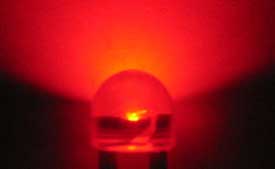| Posted: February 13, 2007 |
Simple biofuel cells with nanotechnology |
|
(Nanowerk News) A simple enzyme-based biofuel cell has been made by a team of Japanese scientists ("Fructose/dioxygen biofuel cell based on direct electron transfer-type bioelectrocatalysis").
|
|
The cell, made by Kenji Kano, Seiya Tsujimura and colleagues at Kyoto University, Japan, uses enzymes to catalyse oxidation of D-fructose and reduction of dioxygen to generate electricity.
|
 |
|
The fuel is oxidised by one enzyme at the anode, and the electrons reduce dioxygen via another enzyme at the cathode.
|
|
Most previous biofuel cells have needed a mediator molecule, which is stable in two oxidation states, to speed up electron transfer from the enzyme to the electrode. By engineering carbon electrodes with carbon nanoparticles, the team bound a fructose oxidising enzyme, D-fructose dehydrogenase, onto the electrode surface, increasing the speed of electron transfer to the anode without needing a mediator. Another enzyme, laccase from Trametes sp., was used to reduce dioxygen at the anode, completing the circuit.
|
|
Eliminating the need for mediators may simplify the construction of biofuel cells, and as the device can operate under mild conditions, Kano hopes that 'one compartment biofuel cells may be developed as power sources of implantable devices within humans, such as pacemakers, insulin pumps, sensors and prosthetic units.'
|
|
Frederic Barriere of the University of Rennes, France, said the work is a significant development, and that he 'awaits impatiently future developments such as refining such electrodes towards a layer by layer approach to increase the maximum current density.'
|

